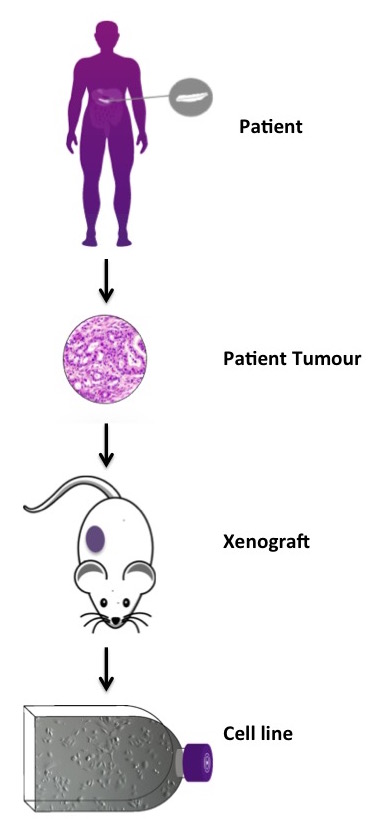Accessing Patient Derived Cell Lines and Xenografts
PDCL Availability
A total of 18 Patient Derived Cell Lines are available to researchers. A description of each PDCL can be found below:
TKCC-02-LO
TKCC-05
TKCC-06
TKCC-07
TKCC-09
TKCC-10-LO
TKCC-12
TKCC-14
TKCC-15-LO
TKCC-16-LO
TKCC-17-LO
TKCC-18-LO
TKCC-19-LO
TKCC-22-LO
TKCC-23-LO
TKCC-25-LO
TKCC-26-LO
TKCC-27-LO
Patient-Derived Xenografts (PDX)
PDX with Pancreatic Ductal Adenocarcinoma, variable in their treatment responses, histology and patient survival time are also available to access. Please contact us on research@pancreaticcancer.net.au for further detail on accessing PDX’s.
Avner APGI BioResource Request Form
Follow the Avner APGI BioResource Request Form and consider the following 5 sections:
Section A – Applicant Details
Section B – Project Details
Section C – BioSpecimen Access
Section D – Clinical Data Access
Section E – Ethics
Sections A & B are mandatory and must be completed for PDCL requests. Please electronically sign the completed form, attach any relevant documentation and send your paperwork in PDF format to research@pancreaticcancer.net.au.
Please be sure to read the APGI’s BioResource Cost Recovery guidelines to have a clear understanding of the costs associated with access to PDCL’s, prior to submitting an application.
Application and Review Process
The APGI Leadership Team will assess the PDCL application. You will be notified following approval of your PDCL application where a Garvan Material Transfer Agreement (MTA) will be initiated. Once the MTA is executed PDCL’s will be distributed centrally by the Personalised Cancer Therapeutics Group along with an invoice.
Acknowledgement of APGI & Garvan Institute
We request that the APGI and Garvan Institute of Medical Research be acknowledged in publications arising from the use of our PDCL’s. This must appear in the Methods or Acknowledgements section as a minimum. Recommended wording is as follows: ‘The patient derived cell lines were provided by the Australian Pancreatic Cancer Genome Initiative (APGI, www.pancreaticcancer.net.au) and the Garvan Institute of Medical Research (Sydney, Australia).


